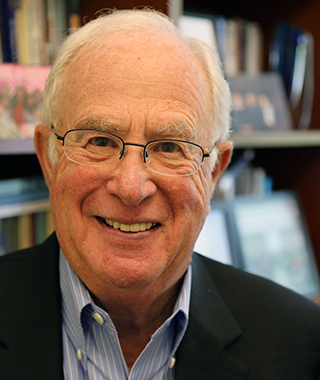
Stuart Altman is a leading health economist who has been at Brandeis and the Heller School for almost 48 years. During that time, he served as the dean of Heller for three different terms, the interim president of Brandeis for one year, and the Sol C. Chaikin Professor of National Health Policy at Heller until his retirement in 2025.
How have Heller and Brandeis supported you in your work?
From early on in my tenure at Brandeis, the trustees of the university encouraged me to be actively involved in the health care system. As a result, my two careers in academia and in health care have been interconnected. At the Heller School, I also worked to create a health care research group, which is now the Schneider Institutes, and helped raise substantial funds to support our research and education. Brandeis and Heller have been like family to me.
How has health policy changed since you started and what still needs to change?
When I started my career, there were very few health economists, but now there are hundreds, if not thousands. It has become an increasingly important subject, as health care spending consumes a larger and larger percentage of our national income.
Unfortunately, the key problems that were paramount in the early 1970s, when I got started, are still major problems today: The cost of health care has been and continues to be much too high and almost unaffordable for big segments of our population. We have a very complicated system that often leads to people getting either inadequate care or none at all. While we’ve made substantial progress in some areas, particularly in covering the uninsured, the progress is far from complete. There’s real concern today that many of the improvements could be undone by the current political forces.
What has been the hardest part of turning health policy ideas into real change?
Health care is so important for individuals, but it’s so expensive that it impacts every segment of our system, from the people who pay the bills — the employers, the individuals and the government — to those who deliver care — doctors, nurses, hospitals and pharmaceutical companies. It has become the largest industry in the country, and as a result, any changes that are being proposed impact big constituencies. When you make improvements in an area that helps one group, other groups, at times, view it negatively. There is constant political and economic pressure to mold reform according to how each group sees how it impacts them. The health care system isn’t something that is simple to change; it’s extremely complex, and the way we organize the system to provide and pay for care affects millions of people.
Are there any specific moments or decisions that you’re most proud of in your career?
I’ve been fortunate to have played a role in some very important decisions and issues that have formed the basis for much of how our system now operates. While working in the administration of President Nixon, I helped create the national health insurance plan that he proposed in 1974, many components of which eventually became the Affordable Care Act passed by President Obama in 2010.
I’ve been involved in different ways to try to lower the growth in health care costs, from the Cost of Living Council in 1971 to efforts to make the delivery system, and how the Medicare program pays hospitals and physicians, more efficient. I was also fortunate to be selected to head the Massachusetts Health Policy Commission, which was established to slow the growth of health care spending in the state and keep it in line with the growth in the state’s income.
What is your advice for the next generation of health policy leaders?
Our system has gotten even more complicated and there are many more actors in the game. When I started my career, I did not have any formal training in health care economics. I had to learn it all on the job, but there was time to learn. That’s not the case today, so I encourage anybody who wants to enter this field to get a decent education that provides them with knowledge to navigate the system and to understand the implications of the reforms they advocate.
What do you hope your legacy in health care and health policy will be?
I want people to remember me as someone who tried to make our health care system more efficient and provide coverage equitably for all individuals. Just because people can’t afford health care doesn’t mean they should go without it.
